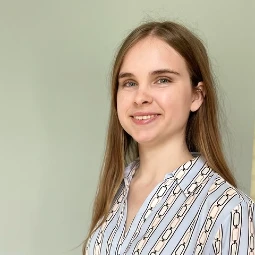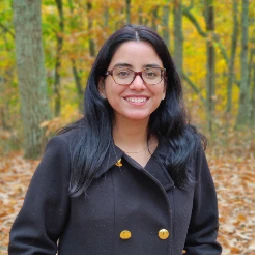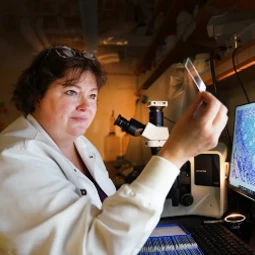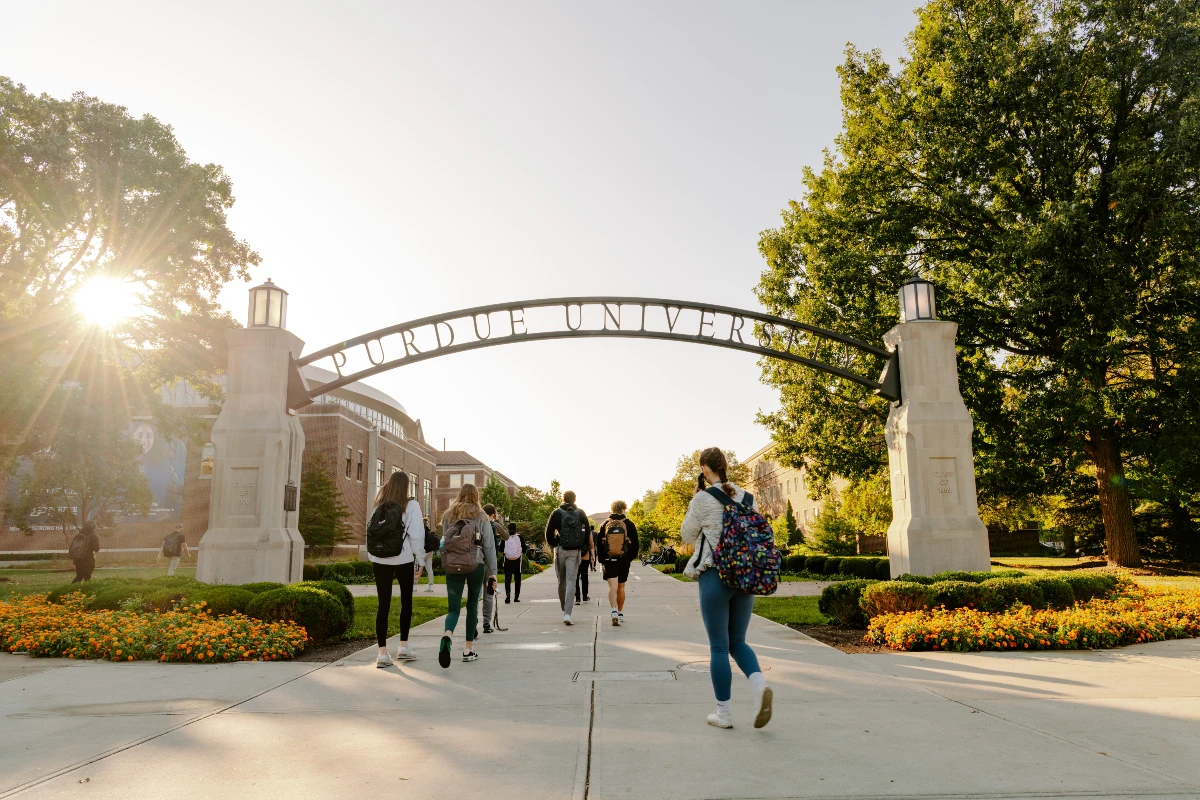Katelin Burow
 Katelin Burow’s childhood passion for gardening led her to plant biology and Purdue, where she joined Dr. Jen Wisecaver’s lab and studies fern reproduction.
Katelin Burow’s childhood passion for gardening led her to plant biology and Purdue, where she joined Dr. Jen Wisecaver’s lab and studies fern reproduction.
What first sparked your interest in basic science and plant biology?
You know how you have chore charts as a kid? I always wanted to do gardening with my mom. That was my favorite chore. In high school, that developed into interests in environmental activism and climate change. I studied biological sciences as an undergrad, and I joined my PhD lab initially interested in algae before becoming a new “fern lady.”
Why did you come to Purdue?
I got a really good scholarship to come to Purdue in my undergrad. There was a constant push for us to go into the medical field from biological sciences. But I sat in a human anatomy class in sophomore year for a week and realized that I really wanted to pursue my love of plants instead. I asked my advisor to switch me out of human anatomy and into plant science. She placed me in this graduate-level plant hormone class taught by Dr. Gyeong Mee Yoon.
I spent so much time in that professor’s office hours to understand that class without previous plant biology knowledge, and she offered to let me join her lab. I worked with her through undergrad, did some cool protein interactions and learned about ethylene. Plant hormones really interested me, and I still study them to this day.
Whose lab are you currently in, and what is your research focus?
I’m in Jen Wisecaver’s lab in the Department of Biochemistry, and my research focus is on the reproduction of ferns. Specifically, Ceratopteris richardii, which is a model fern that’s been used for many years but kind of fell out of use until its genome was sequenced in 2022. Originally, I didn’t know much about ferns, but Dr. Jody Banks, Purdue’s world-class fern researcher, left that project open when she retired and taught me a ton about the subject.
I look for the genes involved in sex determination in Ceratopteris richardii. Ceratopteris releases a hormone from its hermaphroditic gametophytes which turns nearby gametophytes male. This hormone is a gibberellic acid in other ferns, but I’ve also found a brassinosteroid receptor that’s involved in Ceratopteris richardii’s sex determination process. We’re now looking at the possibility of cross-talk between the two hormones.
How has the Center for Plant Biology community impacted you and your experience at Purdue?
I appreciate the Center for Plant Biology’s community. It has provided good friends and collaboration. We do journal clubs now, and learning about the different sides of plant biology has really helped inform my research. Sometimes I just hear other grad students talking about something similar enough to what I work on, so I get to discuss my work with them and get their perspectives.
What makes you excited about your work? What accomplishment are you proudest of?
I think what gets me excited is the culmination of identifying the brassinosteroid receptor involved in fern reproduction. The mutant I found it in was one of the first that Dr. Banks worked on, published in the ‘90s. The improvement of sequencing technology has given us a reference genome for Ceratopteris which has allowed us to use newer techniques, like bulk segregation analysis, that weren’t around when it was first identified. It’s pretty amazing to be working on the culmination of 30 years of research.
Where will your training take you next?
I’d like to stay in academia and go for a postdoc next. I think I still want to stay with ferns. It’s a really fun community to be involved with, but I’m also looking into other areas. Plant genetics is definitely my passion.
What advice would you give an incoming graduate student or postdoctoral researcher?
Look at all different areas, whether or not you’re going directly into a lab or into rotations. Even if it’s just within your own lab, look at all the projects and expand the breadth of your knowledge. When I started, I was only focusing on fern research, but I’ve made some of my breakthroughs by incorporating maize research into my work.
Amanpreet Kaur
 Amanpreet Kaur has always had a natural curiosity and a love for solving puzzles, which gives her the power to unravel the genetic mysteries in maize with Dr. Brian Dilkes.
Amanpreet Kaur has always had a natural curiosity and a love for solving puzzles, which gives her the power to unravel the genetic mysteries in maize with Dr. Brian Dilkes.
What first sparked your interest in basic science and plant biology?
Growing up, I was always curious about the things around me, and it was science that gave me the answers. Encouraged by my aunt and cousin, I applied for an undergraduate program in biotechnology at Punjab Agricultural University (PAU). It provided me an opportunity to explore plant science research. During my undergrad, I undertook a project studying the molecular diversity of maize inbred lines under water-stress conditions. This research experience sparked my interest in plant biology, which only deepened with further research.
Why did you come to Purdue?
I was looking for PhD programs with fully funded positions in crop plant research after finishing my master’s degree. During that time, I met Dr. Guri Johal when he visited PAU. I attended his presentation about his research at Purdue, and later had a discussion with him about his lab’s research on plant architectural traits. Our research interests aligned, and Dr. Johal also told me about the funding opportunities at Purdue. Subsequently, I joined his lab in the Department of Botany & Plant Pathology.
Whose lab are you currently in, and what is your research focus?
I currently work with Dr. Brian Dilkes in the Department of Biochemistry. My research focuses on understanding the genetic and molecular mechanisms that control plant architectural traits. I work with several maize mutants that exhibit unique architectural phenotypes, and study the genetic variations and gene expression changes responsible for them with techniques like GWAS and transcriptomics.
How has the Center for Plant Biology community impacted you and your experience at Purdue?
The Center for Plant Biology (CPB) has had a significant impact on my experience at Purdue. Presenting my research at CPB annual retreats helped me improve my communication skills and taught me how to convey complex ideas clearly and persuasively.
I’m currently serving as a professional development chair on the 2023-24 CPB Trainee Association Executive Board. By planning and organizing events like journal club and professional development seminars, I’ve been contributing to the professional growth of my peers. By nature, I am quite reserved, and this position has allowed me to step out of my comfort zone and has shaped my leadership, management and decision-making abilities.
What makes you excited about your work? What accomplishment are you proudest of?
I feel that research is like solving a complex puzzle. As a plant biologist, each piece of data that I analyze takes me closer to understanding the complexities of plant functioning. It’s this process of continuous learning that fuels my passion and drives my daily pursuits in the lab.
I’m proud of the way I’ve seen myself grow, both personally and professionally. I’m the first in my family to get a PhD. I’m also proud of the fruitful collaborations I’ve had with colleagues that resulted in peer-reviewed publications.
Where will your training take you next?
With my experience in plant genetics and bioinformatics, a research position in industry will be my next step.
What advice would you give an incoming graduate student or postdoctoral researcher?
Your PhD can be a rollercoaster. Keep at it with determination but also try to keep a balance between your work and personal life. When in doubt, seek support and guidance from your mentors and peers. Often the most unexpected results can lead to interesting discoveries, so let your data guide you – and be open to where it leads. Don’t compare your progress to others. Your journey and experiences will be as unique as you are, and that requires embracing a path all your own.
Denise Caldwell
 Fearless in the face of new challenges, Denise Caldwell came back to school after starting a family. Not only has she learned about microscopy and space biology with her advisor, Dr. Anjali Pascuzzi, but she’s discovered a lot about herself, too.
Fearless in the face of new challenges, Denise Caldwell came back to school after starting a family. Not only has she learned about microscopy and space biology with her advisor, Dr. Anjali Pascuzzi, but she’s discovered a lot about herself, too.
APPLY TO CPB GRADUATE PROGRAMS
Create your own Plant Biology success story at Purdue University. Increase your admission chances by applying to up to three affiliated graduate programs with a single application and fee.
learn more
